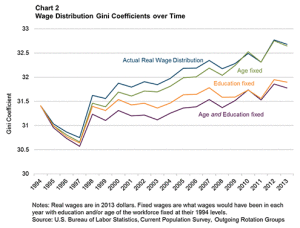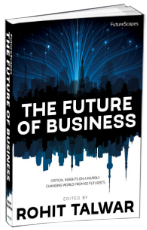01 Jan The 7 Ways Generation Z Will Imprint 2016
It’s hard to believe that we have finally entered the second half of the second decade of the new millennium. So much has changed only in the past 5 years: cloud computing and mobile are mainstream, 3D printers can be bought at the local office supplier and Uber is a verb. (When a noun becomes a verb you know it’s trend that is here to stay)
So what will the world look like for Generation Z in 2016? Or for us who study them? And for those of us who are a little (or a lot) older – what experiences are similar to our own youth and what will be different? If you think about it, you might be able to relate to many of the same trends.
1. The End of Binary Gender
2015 was a big year for the LBTGQ movement. With the U.S. Supreme Court ruling in favor of Same Sex marriage last summer a legislative move that 70% of Millennials and even more Gen Zers support had come to fruition. Around the same time Bruce Jenner left the stage while Caitlyn Jenner took his place. But Jenner’s famed and well-documented sex change was not near as influential for Generation Z as their most esteemed You Tube stars, like Tyler Oakley and Connor Franta. Much in the vein of the popular Netflix show Orange is the New Black, in 2016 we will hear more about sexual fluidity and pan-sexuality.

Remember the ’80s? Breaking the gender dichotomy is a decades old process that even Generation X can remember from their own youth. And maybe that’s why now real progress is being made. This is simply not as new or controversial as it is often made to be. Our institutions are just slow to follow.
2. More livestreaming and self-broadcasting video blurbs
Video messaging is the correct phrase, but very little of the content recorded by apps like DubSmash, Flipagram and Musical.ly have much to do with the traditional meaning of ‘message’, i.e. delivering information. ‘Messaging’ also hides the fact that these videos are rarely directed at a single receiver, but to a larger internet community which knows each other only via the self-choreographed short sketches set to prerecorded tunes or punches that they share with each other. But it says a whole lot of where entertainment is going – to the co-creative crowds. Which brings me to item #3
3. Yes, attention span is getting shorter
According to a study carried out by Microsoft our attention span is indeed getting shorter. Only 12 seconds as a matter of fact. And it’s all those darn smartphones. Knowing that Generation Z is glued to their phones – well, just don’t think you can tell them a 1 ½ hour story anymore. (Hollywood, are you listening?)
4. 62% of High School seniors will at least think about eschewing college
… if they instead could get a meaningful job or start their own company. We wrote about it already in 2013, now more studies are coming out that Generation Z and their parents are considering less expensive career paths than tertiary education. And when they do choose higher ed, they might choose an individualized patchwork solution. Possibly a mix of free or discounted online classes, vocational training and apprenticeships. Silicon Valley tycoon Peter Thiel urges youngsters to become entrepreneurs in lieu of college, as does a new parenting philosophy called Guerilla Parenting. But is this prudent advice?
 The Gini coefficient is a common measure of income inequality and can be used to assess inequality. U.S. Bureau of Labor has a graph which shows the development of inequality while holding variables such as education and age constant. As we can see, the aging of the workforce has little to do with the growing wage gap. Education is the greater divider here. The sharp cost increases for college tuition and textbooks are to blame, so if the return on educational investments is perceived as diminishing, who can blame kids for looking for other alternatives – even if we know that educational differences make up most of the wage income gap in the country? However, as we move deeper into the digital economy we will see the income gap widen even further regardless of education. This is because a greater proportion of income will come from capital.
The Gini coefficient is a common measure of income inequality and can be used to assess inequality. U.S. Bureau of Labor has a graph which shows the development of inequality while holding variables such as education and age constant. As we can see, the aging of the workforce has little to do with the growing wage gap. Education is the greater divider here. The sharp cost increases for college tuition and textbooks are to blame, so if the return on educational investments is perceived as diminishing, who can blame kids for looking for other alternatives – even if we know that educational differences make up most of the wage income gap in the country? However, as we move deeper into the digital economy we will see the income gap widen even further regardless of education. This is because a greater proportion of income will come from capital.
5. They will play with (and be recorded by) robots
Or at least the AI based personal assistant is increasingly becoming embedded into their toys. Wearables that track everything our kids do and say have been around for a while, but they’re gradually entering our toys too. This a whole other dimension because, unlike the Fitbit that you clasp around your wrist, toys traditionally interact with our emotions.They are trusted confidants believed by children to exist outside of the scrutinizing eyes of adults. You can read more about the various reactions to the Toy-AI trend here.
6. Last year Gen Z challenged “Big Food”. This year they will hone in on “Big Fashion”
Given Millennials and Gen Z’s relatively strong interest in environmental production and resource management, the fashion industry has received little attention. This despite the fashion industry being the 2nd biggest polluter of freshwater and a prolific user of natural resources and cheap labor. H&M is now pre-empting protests by setting up recycling bins where “fast-fahionistas” can deposit yesteryears’ garments so the materials can live a second life and end up on the racks once again as new couture.
This growing awareness will likely bring 3D printing of clothes to the forefront, encouraging the fashion forward and environmentally forward to look to 3D technology to reuse material and reduce carbon footprint.
By the way, did you know members of Generation Z have filed a class-action lawsuit against the U.S. government for failing to do enough about climate change and thus ruining young people’s future? These kids care deeply about the environment, are highly informed and are not just sitting around. They are creating change.
7. You will read a lot about “The Founders” – along with all the other generational labels they now carry
When MTV recently asked members of this generation to name themselves as a generation recently, they called themselves “The Founders”. Not a surprise really, given the relentless deification of Silicon Valley start-up mavericks over the past years. Who doesn’t want to be the founder of the next Tesla, Uber or Google? For a while now we have witnessed the revenge of the nerds, where computer scientists and engineers have replaced rock stars and pro-athletes as the most coveted professions among young people. But the current crop of entrepreneurs the kids look up to are more like people such as Uber-founder Travis Kalanick – founders of companies who didn’t get to quick success because of the depth of their scientific knowledge, but because of an idea that takes off – and better luck than most. The trouble of course is that less than .000000001% of start-ups will reach Uber-size dimensions and this can be a problem if you believe that the few who made it big did so only by their own vocation and hard work.
The similarity to The Builders (also called G.I generation), who came of age around the last crisis era about 100 years ago, is striking. If the inequilibrium of history oscillate constructive and destructive forces, it’s quite interesting to notice the great urge to build and conserve during tough times while the inclination to challenge status quo most often happens in times of lesser volatility.
Did we leave anything out? Please use the comment section if you have other predictions for Generation Z in 2016!
Image: Happy Holidays 2016



Sorry, the comment form is closed at this time.